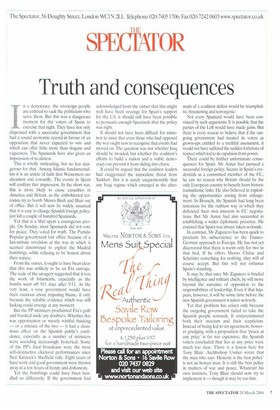Truth and consequences I n a democracy, the sovereign people are
entitled to sack the politicians who serve them. But this was a dangerous moment for the voters of Spain to exercise that right. They have not only dispensed with a successful government that had a sound economic record in favour of an opposition that never expected to win and which can offer little more than slogans and vagueness. The Spaniards have also given an impression of weakness.
This is wholly misleading, but no less dangerous for that. Among Islamic fundamentalists it is an article of faith that Westerners are decadent and cowardly. The events in Spain will confirm that impression. In the short run, this is more likely to cause casualties in America and Britain, as the emboldened terrorists try to bomb Messrs Bush and Blair out of office. But it will now be widely assumed that it is easy to change Spanish foreign policy: just kill a couple of hundred Spaniards.
Yet that is a libel upon a courageous people. On Sunday, most Spaniards did not vote for peace. They voted for truth. The Partici° Popular government lost office because of a last-minute revulsion at the way in which it seemed determined to exploit the Madrid bombings, while refusing to be honest about their nature.
From the outset, it ought to have been clear that this was unlikely to be an Eta outrage. The scale of the savagery suggested that it was the work of Islamicists, especially as the bombs went off 911 days after 9/11. At the very least, a wise government would have been cautious about imputing blame, if only because the reliable evidence which was still lacking could emerge at any moment.
But the PP ministers proclaimed Eta's guilt and brushed aside any doubters. Whether this was opportunism or merely wishful thinking — or a mixture of the two — it had a disastrous effect on the Spanish public's confidence, especially as a number of ministers were sounding increasingly hysterical. Some of the PP's final broadcasts were the most self-destructive electoral performances since Neil Kinnock's Sheffield rally. Eight years of hard work and good government were thrown away in a few hours of frenzy and dishonesty.
Yet the bombings could have been handled so differently. If the government had
acknowledged from the outset that this might well have been revenge for Spain's support for the US, it should still have been possible to persuade enough Spaniards that the policy was right.
It should not have been difficult for ministers to insist that even those who had opposed the war ought now to recognise that events had moved on. The question was not whether Iraq should be invaded, but whether the coalition's efforts to build a nation and a viable democracy can prevent it from sliding into chaos.
It could be argued that the coalition leaders had exaggerated the immediate threat from Saddam. But it is surely unquestionable that any Iraqi regime which emerged in the after
math of a coalition defeat would be triumphalist, threatening and terrorgenic.
Not every Spaniard would have been convinced by such arguments. It is possible that the parties of the Left would have made gains. But there is every reason to believe that if the outgoing government had treated its voters as grown-ups entitled to a truthful assessment, it would not have suffered the sudden forfeiture of respect which led to its expulsion from power.
There could be further unfortunate consequences for Spain. Mr Aznar had pursued a successful foreign policy. Secure in Spain's credentials as a committed member of the he saw no reason why Britain should be the only European country to benefit from historic transatlantic links. He also believed in exploiting the opportunities arising from enlargement. In Brussels, the Spanish had long been notorious for the ruthless way in which they defended their own interests in EU negotiations. But Mr Aznar had also succeeded in establishing a wider diplomatic presence. He ensured that Spain was always taken seriously.
In contrast, Mr Zapatero has been quick to proclaim his subservience to the FrancoGerman approach to Europe. He has not yet discovered that there is room only for two in that bed. If he offers Messrs Chirac and Schrbder something for nothing, they will of course accept. But this will not enhance Spain's standing.
It may be that once Mr Zapatero is briefed by intelligence and military chiefs, he will move beyond the naiveties of opposition to the responsibilities of leadership. Even if that happens, however, it will be some time before the new Spanish government is taken seriously.
Yet that problem has arisen only because the outgoing government failed to take the Spanish people seriously. It underestimated both their stoicism and their scepticism. Instead of being led to an agreement, however grudging, with a proposition that 'peace at any price' is far too expensive, the Spanish voters concluded that lies at any price were much too dear. There is a lesson here for Tony Blair. Archbishop Ussher wrote that the man who says .Honesty is the best policy' is not an honest man. It is still the best policy in matters of war and peace. Whatever his own instincts, Tony Blair should now try to implement it — though it may be too late.


















































































 Previous page
Previous page